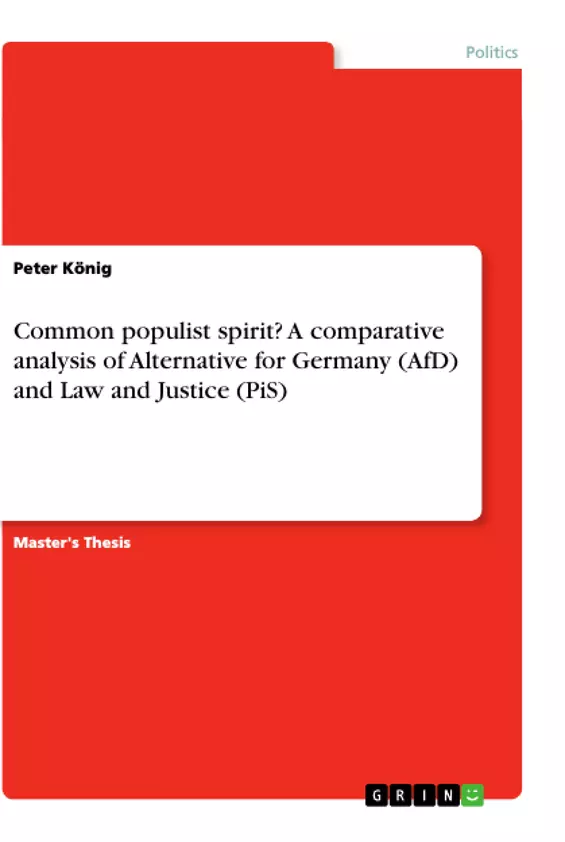This study sheds light upon the phenomenon of populism by comparing the parties Alternative for Germany and Law and Justice regarding a common populist spirit. While the manifold understandings of populism and its origins are expounded, the study applies the ideological approach of populism to further conduct a research upon the right-wing populist character of both parties. However, both parties are not right-wing populist parties in their very fundament but underwent a transformation into such through two populist moments. Applying a binominal logistic regression reveals populist determinants of voting behavior for each party, and thus, their ideological core. While a fer-tile breeding ground for right-wing populist attitudes is given after the respective first populist moment of each party, it can be shown as well that such attitudes have not been decisively influencing voting decision at that time.
Inhaltsverzeichnis (Table of Contents)
- Introduction
- Chapter 1: Populism-A Conceptual Framework
- 1.1. Of Origins and Fundaments
- 1.2. Approaches to the Phenomenon
- 1.3. New Populism
- 1.4. Interim Conclusion
- Chapter 2: AfD and PiS-comparable at all?
- 2.1. Two Parties, Two Systems
- 2.2. Populism: The Case of AfD
- 2.3. Populism: The Case of PiS
- 2.4. Interim Conclusion
- Chapter 3: Analyzing the Spirit-A Quantitative Approach
- 3.1. Methodological Approach
- 3.2. Ideology and Voting Behavior
- 3.3. Personal Traits as Determinants for voting?
- 3.4. Interim Conclusion
- Conclusion and Outlook
Zielsetzung und Themenschwerpunkte (Objectives and Key Themes)
This study aims to examine the phenomenon of populism by comparing the Alternative for Germany (AfD) and Law and Justice (PiS) parties. It explores the ideological approach to populism and its application to right-wing populist parties. The study aims to understand the populist transformation of these parties and analyze the determinants of voting behavior based on ideological core. The study seeks to uncover commonalities and differences between the two parties, ultimately contributing to a deeper understanding of populism in a comparative context.
- Populism as a political phenomenon and its theoretical framework
- Right-wing populism and its manifestation in the AfD and PiS
- Ideological determinants of voting behavior for both parties
- Comparative analysis of the AfD and PiS regarding a common populist spirit
- Populist moments in the development of both parties
Zusammenfassung der Kapitel (Chapter Summaries)
The study begins by outlining the conceptual framework of populism, discussing its origins and various approaches to its study. It then delves into the specific case of "new populism," emphasizing its characteristics and contemporary relevance. Chapter 2 compares the AfD and PiS, examining their respective political systems and the role of populism in their development. This chapter analyzes how both parties, despite their differences, exhibit populist traits, highlighting the distinctive features of populism in each case. Chapter 3 adopts a quantitative approach to analyze the relationship between ideology and voting behavior for both parties. It utilizes a binominal logistic regression to investigate the determinants of voting, including personal traits, and examines the impact of populist attitudes on voting decisions.
Schlüsselwörter (Keywords)
The study focuses on the concept of populism, examining its connection to right-wing ideologies and its influence on the AfD and PiS parties. It investigates voting behavior, ideological determinants, and comparative analysis within the context of populism. Key terms include: populism, right-wing, ideology, voting behavior, comparative study, populist moment, logistic regression, AfD, PiS, and political systems.
Frequently Asked Questions
What is the common "populist spirit" between AfD and PiS?
The study compares the ideological core of the Alternative for Germany (AfD) and Law and Justice (PiS), analyzing how both parties transformed into right-wing populist entities through specific "populist moments."
How does the study define populism?
The study expounds on manifold understandings of populism but specifically applies an ideological approach to analyze the right-wing populist character of the compared parties.
What are the determinants of voting behavior for these parties?
Using binominal logistic regression, the study identifies that while a fertile ground for populist attitudes existed early on, these attitudes did not always decisively influence voting decisions in the parties' initial phases.
What is a "populist moment"?
A populist moment refers to a turning point or event that triggers a transformation in a party's identity, leading it toward a more pronounced populist ideology and communication style.
Are AfD and PiS comparable despite being in different political systems?
Yes, the study argues that despite the differences between the German and Polish political systems, both parties share similar populist determinants and ideological transformations that make a comparative analysis valuable.
- Citation du texte
- Peter König (Auteur), 2019, Common populist spirit? A comparative analysis of Alternative for Germany (AfD) and Law and Justice (PiS), Munich, GRIN Verlag, https://www.grin.com/document/584220



